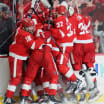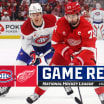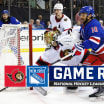TORONTO -- His shirt removed, Chris Snow leans over a desk, resting one arm on the other. From this vantage, his right hand is hidden, only his upper arm and biceps revealed, and so he looks healthy, normal. Russell Rasquinha sits behind him, a makeshift table lined up with his instruments, as he rubs an iodine solution in circles around Snow's back with a blue foam brush.
Gene therapy giving Flames executive Snow hope in ALS fight
NHL.com goes behind scenes of clinical trial fueling optimism for breakthrough
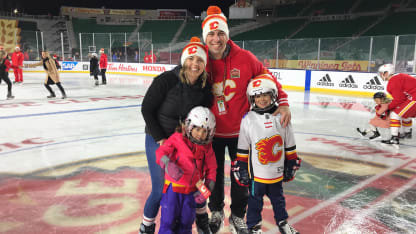
He swipes once. Twice. Three times.
The lidocaine goes in, to freeze the skin. Then the needle.
Slowly, precisely, Rasquinha removes spinal fluid through the lumbar puncture, commonly known as a spinal tap. He then gives him the injection that Snow and his wife, Kelsie, believe is saving his life.
They believe because they want to, because they have to, and because -- against every single odd, against every single thing you've ever heard regarding amyotrophic lateral sclerosis, or ALS -- it just might be working.
Snow, a 38-year-old assistant general manager for the Calgary Flames, was diagnosed with ALS on June 17. It was not a surprise. His family has been ravaged by the familial form of the disease, with his father, two uncles and a cousin having died from ALS caused by the SOD1 genetic mutation.
ALS affects motor neurons, the cells that control muscle movement. As ALS progresses, the motor neurons die, the muscles become weaker, and eventually movement slows or becomes impossible.
It's what Snow saw happen in his right hand, how he began to suspect that the disease had come for him too. But almost immediately after his diagnosis, which usually carries a life expectancy of between six and 18 months, Snow enrolled in a phase 3 clinical trial at Sunnybrook Health Sciences Centre in Toronto for those with the SOD1 mutation, which affects 2 percent of ALS patients.
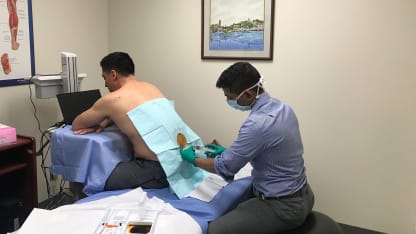
In this, he was lucky, both that it was available and that he qualified.
He has made the trip to Toronto with Kelsie every four weeks since then, though initially there was a two-in-three chance that every trip brought him an injection of tofersen, a drug that doctors and researchers hoped could slow the progression of the disease.
For the first six months of the trial, two-thirds of the study participants are given the actual drug. One-third are given a placebo.
He does not know for sure whether he was in the group given the medication or the placebo. The Snows believe he was one of the lucky ones, one of those given tofersen. They believe because they, remarkably, have not seen a progression of the disease since he entered the trial. He still does not have use of his right hand. He has use of everything else, all the things they feared might slip away from him in the weeks and months after they confirmed the diagnosis.
The injection takes two minutes, two minutes of silent meditation for Snow. He thinks about his mom, Linda, who committed suicide in 2012. "Because," as he says, "she'd be really happy and really sad if she were here. One of the things I got from her was a real joy for life. She always was happy that I was that way. So, I think about her and how I get to move on because of this." He thinks about his dad, Bob, who died of ALS in 2018, and his uncles and his cousin.
He wishes they had had the opportunity for these two minutes. For that two-in-three chance.
"I move through those thoughts fairly quickly," he says. "I usually say a prayer or two. For them. Probably in part for myself."
\\\\
The Snows have already been at Sunnybrook for hours at this point, Feb. 20 marking their 11th visit to this hospital, his 10th lumbar puncture. At 9:15 a.m., the driver picks them up at their hotel for the 20-minute ride. When they walk in the doors at the hospital, a massive campus that looks like a small airport, Snow is on edge.
They find their way down to Room UG21, where Snow will undergo a battery of tests, all of them designed to determine whether the progress of the disease has slowed, whether it has stopped, whether it has -- God forbid -- picked up again.
They start with a detailed neurological assessment.
"Have you experienced any changes to your health since you were last here?"
"No."
"Have you noticed any difference in your speech?"
"No."
They test knowledge next, the year, the season, the province, the city. A series of words that never changes from visit to visit: apple, penny, table. He counts backward from 100 by seven.
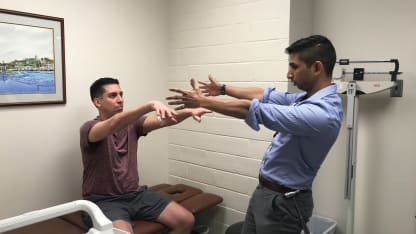
These are the hardest weeks, when the anxiety sweeps up and the visit looms closer and the fear that "no change" might have turned into "some change" pierces the bubble they have formed around themselves.
"My bad hand, I don't have any expectations for it being better," Snow says. "It's more the opposite, that I'm always kind of concerned about and testing the good parts. The other hand, in particular. Living without one hand is not difficult. Living without two hands is difficult.
"It's testing my good hand, and then I overtire it. And then I convince myself something is wrong."
This is when Kelsie can sense his perpetual optimism faltering.
"None of the physical aspects of any of that, the lidocaine, the needle itself, I couldn't care less about those things," Snow says. "It's just the emotional anguish that you can put yourself through, with wondering, am I a little bit different? And if I'm a little bit different, what does that mean?
"Because that's totally unknown. But then you worry, that could be a slippery slope."
He does a breathing test, to determine lung capacity, and one to test muscle strength. That is the one that gives him the most anxiety, because they are testing his hand and his strength, and that is where the disease started to eat at him.
"This is our 10th time doing most of these tests," Snow says.
"And there has not been any changes," research coordinator Jahan Mookshah says.
"Those are our favorite words," Kelsie says.
Kelsie bends down and ties her husband's shoes. The testing is over, for the moment.
\\\\
There is no blood test for ALS. It's only diagnosed by process of elimination, a factor that often can be problematic, as the disease progresses while the patient is still waiting for answers. Snow was told June 10 by an EMG technician in Calgary that it was likely ALS, a diagnosis that was confirmed a week later by Dr. Michael Benatar at the University of Miami.
It was the last answer they wanted in the world. It was a death sentence.
They crumbled, seeing an unknown present, a future robbed.
"I don't know how we did it," Snow said. "We did our days, and then we cried."
Back in Calgary, fellow assistant general manager Craig Conroy got the news on the phone from Snow, while looking at Snow's kids, Cohen and Willa, now 8 and 5, who were staying at his house while their parents were in Miami. As Conroy said, "That just breaks your heart."
But there was some good news.
Snow had the best-case scenario: a family history and a mutation of the SOD1 gene. He had pressed the issue with doctors, over and over again, after starting to feel the weakness in his right hand while lifting weights during the Stanley Cup Playoffs in April, even as he wanted to believe it was a pinched ulnar nerve, desperate for any answer but this. For Snow, that meant it was only a matter of months between the onset of symptoms and the diagnosis, as opposed to 1 1/2 to 2 years, which is the average.
Which was why when the Snows talked to Benatar on June 17, it was like being flattened and lifted up in the same moment. They confirmed Snow had ALS. They also learned there was a trial, with openings for those with a fast-progressing form of the disease, like him. There was something they could do. There was a place they could go. There was a medicine he could take, produced by Biogen, a company whose corporate headquarters are on Binney Street in Cambridge, Massachusetts, the exact street where Snow lived when he moved there to work at The Boston Globe, another career and another lifetime ago.
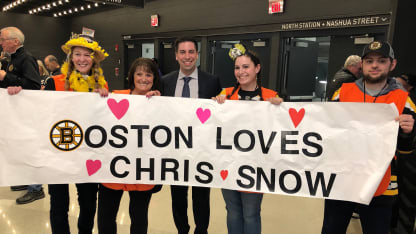
There was -- maybe, possibly -- hope. An impossibility in this world.
"It's just like someone believably telling you you're going to die, then telling you you might not die," Kelsie said. "You can't describe that in a more dramatic way than that. You feel like you got your life back. You've got a chance. Just a chance, right?"
Most of the time ALS is sporadic -- that is, not inherited. But in 5 to 10 percent of cases, there is a familial link, an altered gene that has folded. When Kelsie researched trials in the immediate aftermath of the diagnosis, she realized that the studies that were furthest along happened to be for SOD1, Snow's mutation, the second-leading cause of familial ALS.
They would head to Toronto every month, their kids left with a rotating selection of friends, off to get the injection that might -- or might not -- include the liquid hope that his future rested on.
They had six months in which he could have been receiving either the drug or the placebo, until last month, when they were finally assured he would be getting the medication from this point on.
They told their kids that they would have to have a summer to last a lifetime.
"Because we felt like it was maybe going to have to," Kelsie said.
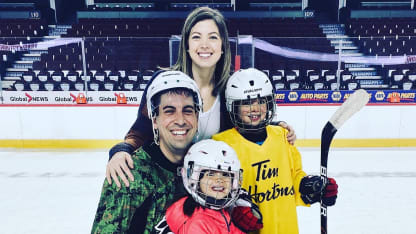
They jammed in everything, all the bike rides and ice cream and pictures, the trip to Merrymeeting Lake in New Hampshire, Snow's family cabin. They jammed happiness in every moment, the tears reserved for private times, for when they couldn't hold it in any longer, wiped away when the kids approached. She wondered if he would make it to February and, if he did, whether he would want to hang around once he got there. She told him to just stay the way he was. They put one foot in front of the other and, still, they don't know exactly how.
By October, they had started to feel differently. Hopeful.
Snow got back on the ice, courtesy of a Flames equipment manager, who sewed his glove into a fist, enabling him to grip a hockey stick. He shot a puck. It rang off the crossbar. Kelsie took a video. It was evident to her that the disease had not progressed, not robbed him of any more strength.
That moment, that month, changed them.
"I felt like that was probably the first moment where I could really breathe," she said.
They went public on Dec. 18, and it ricocheted around the hockey community. Kelsie wrote a letter detailing their diagnosis and their hope, something she has continued to chronicle on her blog, kelsiesnowwrites.com, and recently, in a story that ran in Sports Illustrated.
It has become a piece of her every day, every thought, something that still fells her at a moment's notice. When she is asked if there's been a day that she hasn't thought about ALS since the diagnosis, tears start to flow down her face.
"These three letters are a part of my life forever," Kelsie says. "I sure wish they weren't. But I know that a lot of good things will come to us as a result of this. And I've seen a lot of good in a lot of people because of this.
"There's so much beauty in grief, and there's so much beauty in sadness and tragedy. Because you get to see the best in people. And that's not a small thing. But I wish I didn't have a byline in Sports Illustrated. I don't want a byline in Sports Illustrated. I don't want to be telling this story. But if this is what I'm here for, then I'm OK with that. It's not small. I know that. I know that being there for somebody you love is significant. It's enough for me."
She swipes at the tears, running her fingers underneath her eyes. She sniffles.
"This is because I know you, too," Kelsie says, starting to laugh amidst the tears. "That's the problem."
\\\\
It has been 15 years since I met Kelsie and Chris, back when she was still Kelsie Smith and he was still a baseball writer. The summer of 2005 was one of those summers that's only possible when you are young and there is no responsibility, no ties, no worry. When a White Russian just before the bar closes seems like a good idea, and a shut-off car in a parking lot is the right place to bare a soul, for a friend to reveal she just might be falling in love.
As Kelsie texted me recently, "Honestly, best summer of my life."
They were too young, realistically, for it to work. She was 21. He was 23. They met in a bar, the White Horse Tavern, down the street from the apartment that Snow would buy in Allston, Massachusetts, and that I would later buy from him and live in for the next decade.
He was the Boston Red Sox beat writer at the Globe, she was an intern in the Globe's sports department out of the University of Kansas, and I would be hired into the sports staff that summer as a general assignment reporter.
They got engaged the next summer, and married in December 2007, on a frigid, 9-degree day in St. Paul, Minnesota, where they moved after he was hired as the director of hockey operations for the Minnesota Wild, an unorthodox move that would launch him on a career in hockey and give me a chance to succeed him on the Red Sox beat at the Globe.
She covered the Minnesota Twins for the St. Paul Pioneer Press. We spent spring trainings together in Fort Myers, Florida.
It's hard to think about that day in 2007, so many years ago now, when they promised a lifetime to each other. Because, as Kelsie said, "That I have extra months is not lost on me. I know that I've been already given a gift. It's just that I want what we all thought we were getting when we got married. That we are going to grow old together."
Kelsie has always trusted in Snow, something she has never been shy about expressing. She's always believed he would do what he said, that he would succeed despite all the odds: That he would make the unheard-of jump from baseball reporter to NHL front office member; that he would figure it out after the Wild let him go; that they could find their way on one income (first hers, then his) in a new city, in a new country with a new baby.
And he did. They did.
"It was always like, Chris will figure this out," she said. "And that's probably an unfair amount of pressure that I put on him, but I just believed in him. I've always believed in him that much."
She still does, even in a battle that, up to this point, has been unwinnable.
\\\\
At 1 p.m., after a pizza lunch, it's time to head back to UG21 for the lumbar puncture. Snow laughs about the diet he has been instructed to stick to -- high protein, high fat, high carb -- because losing weight is a marker of the disease. It's one thing he doesn't mind.
This session, too, starts with some tests. Of reflexes. Hands. Ankles. Feet. Jaw.
"This might hurt," Rasquinha says. "Sorry."
Rasquinha flips his hands over, examines them, tells Snow to relax. This is not Snow's forte.
Snow acknowledges yet again that he cannot do anything with his right hand. That went in June, and the atrophy has set in up to his elbow. Kelsie -- or, if he's at work with the Flames, one of his colleagues -- makes sure to cut his food for him, if needed; they tie his skates and his shoes. "Tight, but not too tight," as she puts it.
Testing done, it's time for the lumbar puncture. Snow is now on the open-label extension of the trial. After this visit, he is assured that the fluid sent into his spine will be tofersen. This is a comfort, even as they believe he has been receiving the medication all along.
"All right," Snow says, "let's rock and roll."
The risks are read out, the warnings given, as they always are. The Snows know this nearly by heart. Rasquinha snaps on sterile green gloves and a baby blue face mask. The lidocaine goes in. "Mosquito bite," Rasquinha calls it. "A little burn. Sorry."
Lorne Zinman enters the room. He is part of the reason for their hope, a man who oozes sunshine as he talks, despite having devoted his life to a disease that to this point has claimed every one of its victims.
"This is exciting," says Zinman, the director of the ALS/Neuromuscular Clinic at Sunnybrook and an associate professor of neurology at the University of Toronto. "This is gene therapy for ALS. I've been talking about this for, like, two decades. The fact that it's a reality and we could be helping people like Chris, it's just the happiest thing. I always say -- apology to my children -- the happiest day of my life will be when we finally have something for this disease, because I've seen too many people go through it."
It is easy for Zinman to be joyful these days. He, like all those who work with ALS, has spent years and years in the darkness, and he somehow just might see a little light emerging, a speck that grows bigger with every day that Snow, and potentially others, are stable.
"It's been decades and decades of, really, failure after failure in ALS," Zinman said. "When I give lectures, I put up a slide and I call it the graveyard of failed trials. And it's just failure after failure. The big turning point came when we found the first gene for ALS in the early '90s."
Researchers put the gene into mice, and the mice started to show signs of disease. They thought a cure would come soon after. They were wrong.
Things started to turn when advances in gene therapy led the focus to shift. They knew SOD1 made a protein, and that the protein misfolded, leading to the killing of motor neurons that led to ALS. That became their target.
On Feb. 3, Kelsie posted a video to Twitter showing Snow lifting his right hand at his wrist. It was something he hadn't been able to do since the disease took hold. They don't know what it means, and they try not to read too much into it, but the idea of stability, let alone improvement, sometimes seems like a dream they do not want to end.
And that is what makes Zinman so excited.
"We don't usually see that in ALS trials," he said. "The objective is to slow things down, not to make things improved. … It's really exciting when you hear something like that, where I'm actually able to do something that I couldn't do before. You always have to take it with a grain of salt … it's just really exciting when you hear something like that."
He envisions a day when a patient like Snow or one of his family members could find out he has the SOD1 mutation, that they could start him on the drugs in the pre-symptomatic phase, as a preventative, similar to the way that doctors have been able to use PrEP to keep HIV from taking hold, or the way that doctors use vaccines to prevent diseases.
"We're diagnosing ALS about five to six times a week, and three to four of our patients die every week," Zinman said. "I've been doing this for 15 years now. I see the faces of these patients, not just them, their family members and what they went through, so to be able to offer someone something like this -- research is hope."
When Zinman and I exited the room, I later learned, Snow grew emotional. He cried. It was joy and relief and release. He had finished another session at Sunnybrook. There had been no change. He soon would be assured of getting more of the medicine that has given him more, where before, he expected there would be less and less.
Because these two minutes, every four weeks, might just be saving him.
"The first few times he was dosed I had full-on panic attacks," Kelsie said. "It was all about the fact that I didn't know what [he was getting]. They'd come in and they'd put this little Ziploc baggie on the desk in there and it had this syringe in it. I remember noticing right away that it was 15 milliliters of this clear fluid. And that was every ounce of hope I had in my life."
\\\\
The appointment over for the month, Snow walks down the corridor, a drab, shabby, beige hallway. It is hardly inspiring, with its fluorescent lights and well-trod flooring. But Snow is nearly bouncing. This is the best he feels all month, his hopes confirmed, the medication, he assumes, flowing through his body.
"Every time I walk this hallway, it's a good feeling," he says. "Because you picture yourself being wheeled."
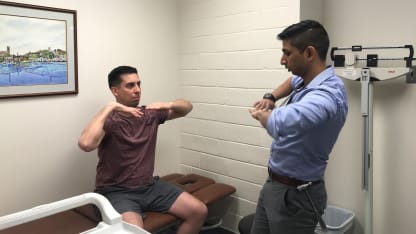
But he can walk. He can breathe. He can do his job, almost the same way he always has, with a few simple modifications. He wears a suit without a tie these days, because he cannot tie one and, really, who needs it? He has not yet transitioned to slip-on shoes, perhaps out of stubbornness.
"I feel, through the course of most days, very normal," Snow says. "And I can put my hand in my pocket and people who don't know don't notice. I can walk through a room or be in a room -- I can just be."
He can do the job that had been his dream.
He can try to beat a disease that no one has.
"I should never have worked in the NHL," he says. "No one had ever gone -- as far as I can tell -- from being a journalist to being directly in a team management position. … So, I had no business doing that. I'm proud of that. I have no business beating this disease. And if I do, it's going to be a way better story than anything else I've ever done."
When Snow was diagnosed, Flames general manager Brad Treliving shooed him away from the office, told him to go spend his time with his family. But being in the office, a place he always wanted to be, has helped stabilize him. Making the calls, negotiating the contracts, analyzing the data, it kept him busy, kept his mind from spinning away.
"I needed to do all the same things," says Snow, who was promoted to assistant general manager Sept. 26 after being director of hockey analysis for the Flames. "Brad even talked to me about, 'Should we get somebody else to help you do your job?' I was like, 'What are you talking about?' … I said, 'I will tell you. You will know. If you don't ask me for anything and I can't give you anything, we're both losing out here.'"
They haven't talked about that since.
"It's been business as usual," Treliving said. "Which is unbelievable to think."
\\\\
These are the kinds of moments that have filled them with hope: when Snow realized he was able to overcome gravity with his right hand; when Cohen yelled from downstairs that his dad was shooting basketballs with his bad hand, supporting the ball and pushing through it, something he had previously had no ability to do.
There is the fact that they have started to talk about the coming summer, about plans, about trips they might take, a calendar. A future.
"We walked in here in June and February felt like a lifetime [away] -- literally," Snow said. "It felt so far away. Like, if we can only make it to February, when I get this for sure …"
"When the season started, when school started, the idea of going into the winter and then coming out the other side of it, well, we're close to coming out the other side of it. It's almost spring."
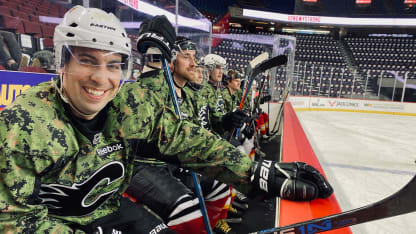
They have no idea how many months, or seasons, or years, or decades are left, and it's part of why they are working so hard. To raise awareness. To raise money. To do what they can, for themselves and their children and all the people that they hope someday will live with this disease instead of dying from it.
So far, the Snows have raised more than $140,000 for ALS research, using his position with the Flames and their contacts in the media to rally the hockey community and beyond to support the cause, using the hashtag #SnowyStrong.
"Just to] change the face of this," Snow says. "Everyone associates this with death, for obvious reasons. If I can be walking around, talking about this and demonstrating that something is working for me. That should hopefully lead to only more support financially for researchers and doctors that are trying to tackle this thing."
That is why, despite their grief, and because of their hope, the Snows are putting themselves in the public eye, telling their story, bringing people into the intricacies of how they now live, in a place of twin emotions, of profound sadness and profound gratitude. Life mixed with death; terror mixed with joy.
It is not easy for either of them. But they want better. More.
Kelsie breaks down again, her voice growing thick and spilling over, as she talks about Cohen and Willa, what they have now -- those pure smiles, that all-encompassing love -- and what she hopes they will never lose, or not for a long, long, long time.
"I want my kids to say, whatever happens, I want them to be proud of how we did it," Kelsie says. "Mom and Dad, they didn't hide from this, they didn't run away from this, they tried to do something with this, leave something better than was there before.
"They can go through life knowing that, no matter what, you have a choice. You can get up in the morning and you can keep trying and you can keep believing and you can keep hoping, whether or not people think you should. And if they can take that out of this, then I think that's pretty much a win.
"And hopefully they get to do all of that with their dad there next to them."
To contribute to ALS research on behalf of Chris Snow, you can donate directly to the
[University of Miami's Miller School of Medicine
or through the
Calgary Flames Foundation
.





